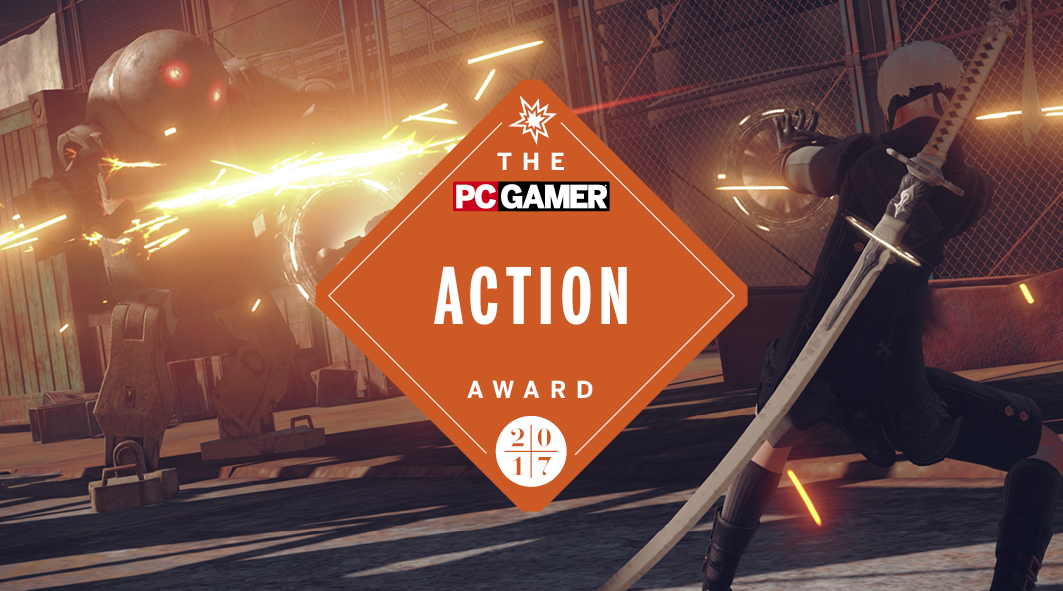
Nier: Automata is our Best Action Game of 2017, as selected by the global panel of PC Gamer writers. It's a shame that the PC version has been disappointing, because this has been a surprise breakout hit, and was nominated by more PC Gamer staff members during our GOTY process than any other game.
Samuel Roberts: An odd hybrid of open world RPG and traditional Platinum combat, that's surprisingly sincere in its themes of what life and death mean to the game's starring androids, and the remnants of the world they're tasked with liberating. It's a shame the PC port has been such a letdown, one that the developers have been slow to correct. Otherwise this is one of the more original and unusual big publisher games of the year, even if the combat isn't quite on the level of Bayonetta. Has a killer soundtrack, too.
Phil Savage: Samuel's correct about the combat. It's good, but not great, and not helped by the fact that Bayonetta—which offers Platinum's best combat, if not the best combat of any hack-'n-slash action game—finally arrived on PC this year. Nier is less demanding, but overall is a much broader, more inventive and more well rounded experience. It's also one of the most poignant action games around. The world is beautifully decrepit, from the post-post-post-apocalyptic city, to the darkly cheerful amusement park and beyond. Its characters are all tragic, be they rusty blobs on legs or fetishistically perfect android dolls. There is no hope in this world, but there is a lot of heart. Quiet and melancholic, Nier: Automata is unlike any other game about smashing up a bunch of murderous robots.
Steven Messner: Nier is a game that continued to surprise me with every hour I played. Bullet hell shooter sequences, hacking minigames, and philosophical robots all come together in an RPG that can span well over 40 hours. That’s impressive. There’s so many ideas spliced together under its skin that Nier feels like a Frankenstein of games. And like its similarly hacked-together robots, it is incredibly endearing. Nier certainly has its share of flaws, but I’d rather play a hundred games with these sometimes head-scratching designs than another sanitized and safe big publisher game.
It's nice seeing something so unusual achieve some level of success this year.
Wes Fenlon: Nier is the rare game that takes meticulous care to justify the why of things that have long been gaming tropes, like HP bars and minimaps. Those meta elements are tied to the chips you install in your android character's brain, and you can take them out to make room for chips that add combo hits or increase your running speed. It's the kind of small touch that makes you wonder what other bits of game design you've taken for granted all these years.
Mostly, though, Nier is a game obsessed with feel and tone, and Platinum delivers on both brilliantly. The "reality" of UI elements having an in-game explanation is an important part of defining how you understand the world. I love the fluidity of dashing and running, and any game that can casually toss out an orgy of rusty R2-D2-lookin' robots and make it work has its tone on lock.
Samuel Roberts: 40 hours and I somehow missed the orgy. Damn! I'll have to watch it on Youtube. The sidequests in Nier Automata, while a bit fetch-y in a lot of cases, hide some of the real magic of the world. I almost ignored them in favour of blasting through the game and its multiple endings, which is what I'm used to doing in most open world games that want you to collect nonsense, escort NPCs or participate in boring races. I'm glad I didn't—they add so much texture to the world, even though Nier is also guilty of making you do tedious races.
Keep up to date with the most important stories and the best deals, as picked by the PC Gamer team.
You meet machines that want to start families, or protect animals, or retrieve their memories, among many other memorable encounters. These stories are usually told with no more than a few lines of text while a stock NPC blankly looks into the distance in a lot of cases, but it's enough because the writing is so evocative. You're playing as a tool, basically, one that's designed to clear Earth so mankind can supposedly return, but each sidequest shows that 2B and 9S are also empathetic. What should be busywork is elevated by the strange humanity of this world's characters.
Nier's world is unusual but compelling: it's a lot of grey boxes nicely lit up, and you end up seeing the same places far too many times. And yet it's captured my attention like few other games this year. It's an unusual success, a game I'll think about for months after, and I can't wait to see what a follow-up looks like.
For more Nier: Automata coverage, check out our review and feature on localising the game.
The collective PC Gamer editorial team worked together to write this article. PC Gamer is the global authority on PC games—starting in 1993 with the magazine, and then in 2010 with this website you're currently reading. We have writers across the US, UK and Australia, who you can read about here.


